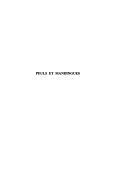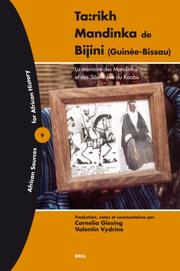| Listing 1 - 6 of 6 |
Sort by
|
Multi
ISBN: 9073782465 Year: 1995 Publisher: Leiden Research school CNWS
Abstract | Keywords | Export | Availability | Bookmark
 Loading...
Loading...Choose an application
- Reference Manager
- EndNote
- RefWorks (Direct export to RefWorks)
Mandingo (African people) --- Marriage customs and rites. --- Social life and customs. --- -Mandingo (African people) --- -Malinke (African people) --- Mandé (African people) --- Manding (African people) --- Mandingue (African people) --- Mandinka (African people) --- Mandino (African people) --- Maninka (African people) --- Maninkaalu (African people) --- Soce (African people) --- Sosse (African people) --- Ethnology --- Marriage customs and rites --- Social life and customs --- -Marriage customs and rites --- Malinke (African people)
Book
ISBN: 3896452088 Year: 2000 Volume: 113 Publisher: Köln Rüdiger Köppe Verlag
Abstract | Keywords | Export | Availability | Bookmark
 Loading...
Loading...Choose an application
- Reference Manager
- EndNote
- RefWorks (Direct export to RefWorks)
Epic poetry [Mandingo ] --- Epische poëzie [Mandingo ] --- Malinke (African people) --- Mande (African people) --- Manding (African people) --- Mandingo (African people) --- Mandingo (Afrikaans volk) --- Mandingo (Afrikaans volk)--Epische poëzie --- Mandingo (Peuple africain) --- Mandingo epic poetry --- Mandingue (African people) --- Mandinka (African people) --- Mandino (African people) --- Maninkaalu (African people) --- Poésie épique mandingo --- Soce (African people) --- Sosse (African people) --- Epic poetry, Mandingo --- Mandé (African people) --- Maninka (African people) --- Ethnology --- Mandingo poetry --- History and criticism --- Social life and customs
Book
ISBN: 9004341684 9004325948 Year: 2017 Publisher: Leiden ; Boston : Brill,
Abstract | Keywords | Export | Availability | Bookmark
 Loading...
Loading...Choose an application
- Reference Manager
- EndNote
- RefWorks (Direct export to RefWorks)
Edition d'un récit en mandinka par Maalaŋ Galisa (octobre 1988) sur la constitution et les conditions de vie au Kaabu, territoire situé entre la Gambie, le Sénégal et la Guinée-Bissau, connu depuis le 16e siècle et détruit vers 1867. La gamme des sujets couvre: le peuplement, le gouvernement, les codes de conduite des guerriers, religieux, esclaves et 'hôtes étrangers', les règles de l'esclavage, du mariage et de la succession, la coexistence des religions, les relations entre groupes d'âge et de genre. Le texte diffère d'autres qui se focalisent sur un unique fondateur-patriarche, Tiramakan de l'épopée de Sunjata. Galisa parle du sud-est du Kaabu, à la frontière avec la Guinée. Il ajoute des couleurs locales au modèle mandinka, évoquant la puissance féminine et certains conflits violents. Edition of a recital in Mandinka by Maalaŋ Galisa (October 1988) on the political constitution and living conditions in Kaabu, a territory situated between present Gambia, Senegal and Guinea-Bissau, known since the 16th century, definitely destroyed in 1867. The narrative presents a range of topics covering governance, codes of conduct of warriors, clerics, slaves and 'strangers', rules of slavery, marriage and succession, the cohabitation of different religions, relations of age and gender. This text is distinctive from others focussing on a single founder-patriarch, Tiramakan of the Epic of Sunjata. Galisa focuses on South-eastern Kaabu, bordering on the region of Labé (Guinea). He adds local colours to the Mandinka model, depicting powerful women and violent conflicts resulting from injustice.
Mandingo (African people) --- Oral tradition --- Oral tradition. --- Tradition, Oral --- Oral communication --- Folklore --- Oral history --- Malinke (African people) --- Mandé (African people) --- Manding (African people) --- Mandingue (African people) --- Mandinka (African people) --- Mandino (African people) --- Maninka (African people) --- Maninkaalu (African people) --- Soce (African people) --- Sosse (African people) --- Ethnology --- History. --- Industries --- Kaabu Empire --- Africa --- Guinea-Bissau. --- Ginia Bisao --- Ginia Bisau --- Ginia Bisau Kyōwakoku --- Giniabisao --- Giniabisau --- Guiné-Bissau --- Guinée-Bissao --- Guinée-Bissau --- Gvinei͡a-Bisau --- Portuguese Guinea --- Republic of Guinea-Bissau --- República da Guiné-Bissau --- République de la Guinée-Bissau --- Gabou (Kingdom) --- Gabu Empire --- Mand�e (African people)
Book
ISBN: 9075894392 9789075894394 Year: 2001 Volume: 32 Publisher: Tervuren : Musée royal de l'Afrique Centrale,
Abstract | Keywords | Export | Availability | Bookmark
 Loading...
Loading...Choose an application
- Reference Manager
- EndNote
- RefWorks (Direct export to RefWorks)
Ethnology. Cultural anthropology --- Senufo [culture or style] --- Somono --- Mandingo [peripheral Mande Style] --- metal --- Burkina Faso --- Mali --- Ivory Coast --- Afrika --- Afrique --- Anthropologie socio-culturelle --- Metallurgie --- Métallurgie --- Socio-culturele antropologie --- Iron --- Iron foundries --- Senufo (African people) --- Mandingo (African people) --- Somono (African people) --- Fer --- Fonderies de fer --- Sénoufo (Peuple d'Afrique) --- Mandingue (Peuple d'Afrique) --- Somono (Peuple d'Afrique) --- Metallurgy --- Industries --- Industrie --- Ironwork --- Industries. --- Metallurgy. --- Sénoufo (Peuple d'Afrique) --- Métallurgie --- Bambara (African people) --- Ethnology --- Senefou (African people) --- Senoufo (African people) --- Siena (African people) --- Syena (African people) --- Malinke (African people) --- Mandé (African people) --- Manding (African people) --- Mandingue (African people) --- Mandinka (African people) --- Mandino (African people) --- Maninka (African people) --- Maninkaalu (African people) --- Soce (African people) --- Sosse (African people) --- Native element minerals --- Transition metals --- Siderophile elements --- Art metal-work --- Decoration and ornament --- Metal-work --- Blacksmithing --- Forging --- Senufo (African people) - Industries. --- Mandingo (African people) - Industries. --- Somono (African people) - Industries. --- Ironwork - Africa. --- Iron - Africa - Metallurgy. --- Cote d'ivoire --- Burkina faso --- Civilisation --- Conditions economiques --- Histoire --- Ethnologie

ISBN: 2865377571 Year: 1997 Publisher: Paris Karthala
Abstract | Keywords | Export | Availability | Bookmark
 Loading...
Loading...Choose an application
- Reference Manager
- EndNote
- RefWorks (Direct export to RefWorks)
Mandingo (African people) --- Fula (African people) --- Mandingue (Peuple d'Afrique) --- Peuls (Peuple d'Afrique) --- Africa, West --- Afrique occidentale --- Ethnic relations --- Relations interethniques --- Ethnicity --- Fula (African people). --- Mandingo (African people). --- Ethnic identity --- Group identity --- Cultural fusion --- Multiculturalism --- Cultural pluralism --- Malinke (African people) --- Mandé (African people) --- Manding (African people) --- Mandingue (African people) --- Mandinka (African people) --- Mandino (African people) --- Maninka (African people) --- Maninkaalu (African people) --- Soce (African people) --- Sosse (African people) --- Ethnology --- Adamawa Fula (African people) --- Adamawa Fulani (African people) --- Eastern Fulani (African people) --- Felata (African people) --- Fellani (African people) --- Foulah (African people) --- Foulbé (African people) --- Ful (African people) --- Fulah (African people) --- Fulahs --- Fulani (African people) --- Fulbe (African people) --- Fulfede (African people) --- Fulfulde (African people) --- Futa (African people) --- Peul (African people) --- Peulh (African people) --- Tukulor (African people) --- Africa, Western --- West Africa --- Western Africa --- Ethnic relations.

ISSN: 15676951 ISBN: 1281925845 9786611925840 9047420705 9789047420705 9789004147249 9004147241 Year: 2007 Volume: v. 9 Publisher: Leiden Boston Brill
Abstract | Keywords | Export | Availability | Bookmark
 Loading...
Loading...Choose an application
- Reference Manager
- EndNote
- RefWorks (Direct export to RefWorks)
Ce tome présente le Ta:rikh Mandinka, un manuscrit rédigé en Arabe et en Mandinka, originaire du village de Bijini en Guinée-Bissau. Inédit jusqu’à présent, le manuscrit consiste en une compilation structurée et très originale sur le Kaabu, réunissant divers récits et chroniques focalisant les débuts mythiques et la chute de cet « empire » païen au milieu du 19ième siècle. Deux versions du manuscrit et plusieurs interprétations (lectures) du Ta:rikh sont reproduites, transcrites, traduites et analysées en tenant compte de questions philologiques, historiques et anthropologiques. L'analyse regarde la communauté cléricale de Bijini en tant que lieu de transmission de savoirs dans un contexte local et régional. Le point focal du livre est l’importance de la diaspora cléricale des Mandinka et Jaakanka (Jakhanké) dans le processus de la construction de l’histoire de l’ « empire » sòoninkee du Kaabu en Sénégambie. Le tome contient un glossaire des noms et des termes mentionnés par les sources, des illustrations, des tableaux, des cartes et des photographies. This volume presents a hitherto unpublished manuscript written in Arabic and Mandinka from the Muslim village of Bijini in Guinea-Bissau, the Ta:rikh Mandinka, a unique and structured compilation unfolding the pagan 'empire' of Kaabu from its mythical beginnings to its downfall in the nineteenth century. Two existing manuscript versions and several oral interpretations of the Ta:rikh are reproduced, transcribed, translated, compared and analysed considering philological, historical and social-anthropological issues (chaps. 1-3). The fourth chapter deals with the clerical community of Bijini as a place of knowledge-transfer in its local setting and within regional networks. The focus of the book is on the importance of the Mandinka and Jakhanka clerical diaspora in the making of the history of the Sooninkee 'empire' of Kaabu in Senegambia. The volume contains a glossary of names and terms mentioned in the sources and is illustrated with maps, photographs and drawings.
Mandingo (African people) --- Soninke (African people) --- Aswanik (African people) --- Dyakanke (African people) --- Gadyaga (African people) --- Marka (West African people) --- Saracole (African people) --- Sarakole (African people) --- Sarawule (African people) --- Serahuli (African people) --- Silabe (African people) --- Toubakai (African people) --- Wakore (African people) --- Ethnology --- Malinke (African people) --- Mandé (African people) --- Manding (African people) --- Mandingue (African people) --- Mandinka (African people) --- Mandino (African people) --- Maninka (African people) --- Maninkaalu (African people) --- Soce (African people) --- Sosse (African people) --- History. --- Social life and customs. --- Bijine (Guinea-Bissau) --- Kaabu Empire --- Gabou (Kingdom) --- Gabu Empire --- Bijini (Guinea-Bissau) --- Mandingo (African people) - Guinea-Bissau - Bijine - History. --- Mandingo (African people) - Guinea-Bissau - Bijine - Social life and customs. --- Soninke (African people) - Guinea-Bissau - Bijine - History. --- Soninke (African people) - Guinea-Bissau - Bijine - Social life and customs. --- Kaabu Empire - History. --- Bijine (Guinea-Bissau) - History. --- Bijine (Guinea-Bissau) - Social life and customs.
| Listing 1 - 6 of 6 |
Sort by
|

 Search
Search Feedback
Feedback About
About Help
Help News
News